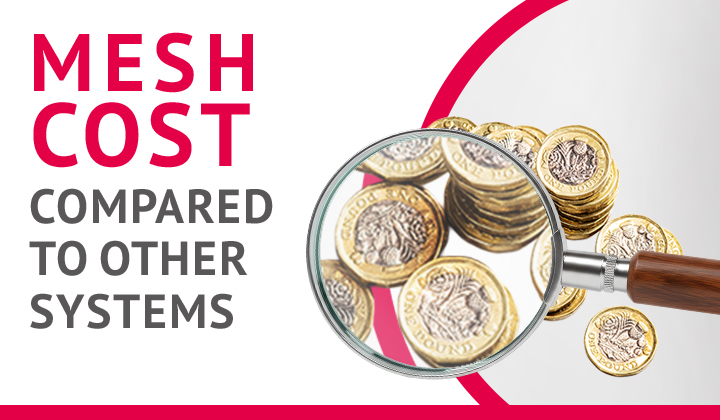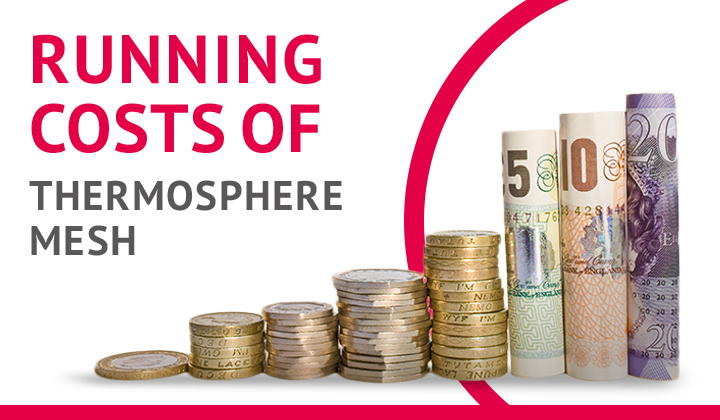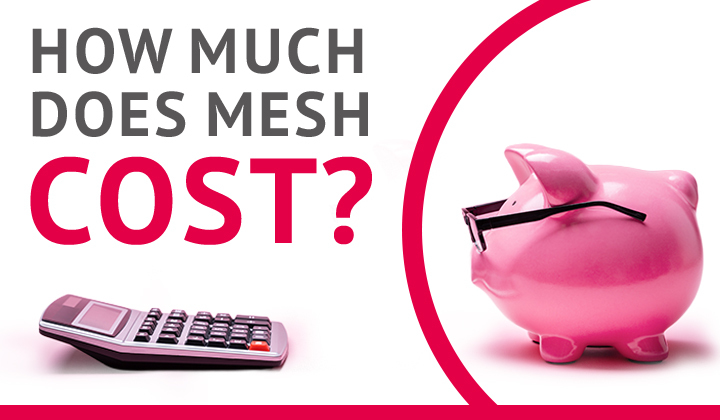9 min read
What are the running costs of ThermoSphere Mesh electric underfloor heating
When you're looking beyond just the upfront cost of installing ThermoSphere Mesh electric underfloor heating, understanding the running costs is...
5 min read
 Jacob Bottley
:
Sep 12, 2025
Jacob Bottley
:
Sep 12, 2025

When considering the cost of ThermoSphere Mesh electric underfloor heating, it's only fair to look at some alternatives. In an ideal world, our one product is perfect for you in every situation or scenario. But that's not realistic, there are so many factors and nuances with each product in each job. So we thought it would just be better to dive into a comparison.
How much does ThermoSphere Mesh actually cost compared to other systems?
The answer: it depends. While ThermoSphere Mesh is competitively priced, the value becomes clear when you factor in installation time, efficiency and long-term reliability.
In this article, we’ll compare ThermoSphere Mesh with other popular electric underfloor heating options, including foil mats, loose-lay cable and decoupling membrane systems, so you can see how they stack up on cost and suitability.
 Mesh mats come pre-spaced, making them one of the easiest systems to install, particularly under tiles. Pre-spaced refers to not only the distance between runs of cable, but also the spacing between each cable loop and the edge of the mesh mat. We space the heating cable by a fixed amount (depending on the output) from the edge of the mesh mat, meaning that you can lay runs side by side for a quicker and easier install. This will give you a completely consistent coverage for your underfloor heating, which isn't the case with a lot of other systems on the market.
Mesh mats come pre-spaced, making them one of the easiest systems to install, particularly under tiles. Pre-spaced refers to not only the distance between runs of cable, but also the spacing between each cable loop and the edge of the mesh mat. We space the heating cable by a fixed amount (depending on the output) from the edge of the mesh mat, meaning that you can lay runs side by side for a quicker and easier install. This will give you a completely consistent coverage for your underfloor heating, which isn't the case with a lot of other systems on the market.
Typical cost
Best for: Bathrooms, kitchens and most tiled spaces where even heat distribution and fast installation matter.
Takeaway: Affordable, efficient and backed by a lifetime cable warranty.
 This is a hybrid approach: a membrane layer that prevents tile cracking, combined with heating cable laid within it.
This is a hybrid approach: a membrane layer that prevents tile cracking, combined with heating cable laid within it.
Typical cost
Best for: Wet rooms, large format tiles, or areas prone to movement or cracking. It is also useful in irregular shaped rooms as you have much more freedom in cutting the membrane to size and laying the cable in whatever way suits the needs of the room.
Takeaway: More expensive than mesh, but the added decoupling and waterproofing benefits may be worth it for specific projects.
 Foil heating mats are another popular choice, especially for timber and laminate floors. They’re designed to sit directly under floating floor finishes without adhesives.
Foil heating mats are another popular choice, especially for timber and laminate floors. They’re designed to sit directly under floating floor finishes without adhesives.
Typical cost
Best for: Laminate, engineered wood, carpet or floating floors where build height is limited.
Takeaway: Similar upfront cost to mesh mats, but more niche in application. If you're installing under a soft floor finish, foil is designed specifically to ensure there is no warping. You would never tile over foil, there are other options available if that is your floor finish of choice.
 While not electric, many homeowners compare the two when planning renovations.
While not electric, many homeowners compare the two when planning renovations.
Typical cost
You'll notice that this is a particularly big price range, which may not be super helpful. The reason for this is that there are so many variables when considering wet underfloor heating. The obvious room size, shape and existing floor build up/finish are factors and there are more on top of these. Our advice would always be to get in touch with a specialist company who can give you a more accurate idea for your specific project. Wet underfloor heating is much better suited to larger new builds, especially when used in conjunction with an Air Source Heat Pump, where as electric underfloor heating is better suited to renovations and small new build apartments.
Best for: Whole-house heating in new builds or major refurbishments.
Takeaway: Higher upfront cost than electric, but cheaper to run long-term if paired with a renewable heat source.
To reiterate what we said in the introduction, we feel that it's only fair to branch out from our own products. Whilst the bias inside me is screaming at me for saying this, there are some pretty good underfloor heating products out there that AREN'T made by us. Here's a couple of examples and what makes them different from ours.
 Warmup’s StickyMat is well-regarded for its ultra-thin 1.8 mm cable. Pricing usually sits around £70-£80 per m² (incl. VAT) depending on system size and it comes with the added reassurance of the SafetyNet™ installation guarantee, which allows for a replacement if the cable is accidentally damaged during fitting. While the slender profile is a strength in certain projects, some installers prefer a slightly more robust feel when handling cables during installation.
Warmup’s StickyMat is well-regarded for its ultra-thin 1.8 mm cable. Pricing usually sits around £70-£80 per m² (incl. VAT) depending on system size and it comes with the added reassurance of the SafetyNet™ installation guarantee, which allows for a replacement if the cable is accidentally damaged during fitting. While the slender profile is a strength in certain projects, some installers prefer a slightly more robust feel when handling cables during installation.
Heat Mat tends to sit in the friendly middle ground when it comes to pricing, typically around £40–£50 per m² (incl. VAT). It offers a broad range of wattage outputs, including 240 W/m² mats for faster warm-up in high heat-loss areas such as conservatories or smaller bathrooms. This makes it a versatile option that balances cost and performance, appealing to installers who want reliable results across a variety of projects. Some users note that the systems can require a little more planning during installation as their layouts aren’t always as straightforward as mesh-based designs, although Heat Mat products are pre-spaced.
![]() Fastwarm Heat Mats offer an attractive option for those seeking ultra-thin heating elements, with their cable just 2 mm thick, among the slimmest on the market. Kits commonly retail from approximately £45 per m² (incl. VAT) for the 200 W m² version. These kits are praised for including everything needed in the box—thermostat, primer, tape, roller—making them particularly appealing to DIYers. Fastwarm also stands out for offering a 50-year warranty, underscoring their confidence in product longevity. In tighter layouts, some installers find the very fine cable spacing a little trickier to position precisely, compared to the more open spacing found on other mesh systems.
Fastwarm Heat Mats offer an attractive option for those seeking ultra-thin heating elements, with their cable just 2 mm thick, among the slimmest on the market. Kits commonly retail from approximately £45 per m² (incl. VAT) for the 200 W m² version. These kits are praised for including everything needed in the box—thermostat, primer, tape, roller—making them particularly appealing to DIYers. Fastwarm also stands out for offering a 50-year warranty, underscoring their confidence in product longevity. In tighter layouts, some installers find the very fine cable spacing a little trickier to position precisely, compared to the more open spacing found on other mesh systems.
![]() Oops, how did this section get in here! Let's compare what we do and don't offer, so that you can make the most informed choice when budgeting or working out your underfloor heating projects. When looking at ThermoSphere Mesh, cost is only part of the story. Prices typically range between £45–£55 per m² (incl. VAT) depending on wattage, which positions it competitively within the market. The mats incorporate TwistedTwin technology, which reduces electromagnetic fields (EMF) and enhances cable durability during handling and installation. Its wire-side-down, self-adhesive mesh speeds up fitting and the lifetime warranty (when registered with a compatible thermostat) offers long-term confidence. Notably, being manufactured in the UK ensures consistent supply and strong local support.
Oops, how did this section get in here! Let's compare what we do and don't offer, so that you can make the most informed choice when budgeting or working out your underfloor heating projects. When looking at ThermoSphere Mesh, cost is only part of the story. Prices typically range between £45–£55 per m² (incl. VAT) depending on wattage, which positions it competitively within the market. The mats incorporate TwistedTwin technology, which reduces electromagnetic fields (EMF) and enhances cable durability during handling and installation. Its wire-side-down, self-adhesive mesh speeds up fitting and the lifetime warranty (when registered with a compatible thermostat) offers long-term confidence. Notably, being manufactured in the UK ensures consistent supply and strong local support.
So, how does the cost of ThermoSphere Mesh compare to other underfloor heating systems?
For most tiled bathrooms, kitchens, and renovations, ThermoSphere Mesh hits the sweet spot — a reliable, mid-range option with long-term value.
❓📊 What does it actually cost 📊❓ ❓📊 What affects upfront cost 📊❓
❓📊 Is it worth it (ROI) 📊❓ ❓📊 Running costs 📊❓
Electric heating made easy
Or contact us via the website, or give one of the team a call on 01622 689440. Find out more about ThermoSphere by reading of one of our other blogs here.
If you want to find out more about some of the other fun stuff we've been up to, follow us on our social media:
LinkedIn: @thermosphere
YouTube: @thermosphere
Facebook: @thermosphere
Tiktok: @_thermosphere
Instagram: @_thermosphere

9 min read
When you're looking beyond just the upfront cost of installing ThermoSphere Mesh electric underfloor heating, understanding the running costs is...

10 min read
If you’ve been considering adding ThermoSphere Mesh electric underfloor heating to your home, one of the biggest questions on your mind is probably:...

8 min read
When people start looking into electric underfloor heating, the first question is almost always: “How much does it cost?” It’s fair. Whether you’re...